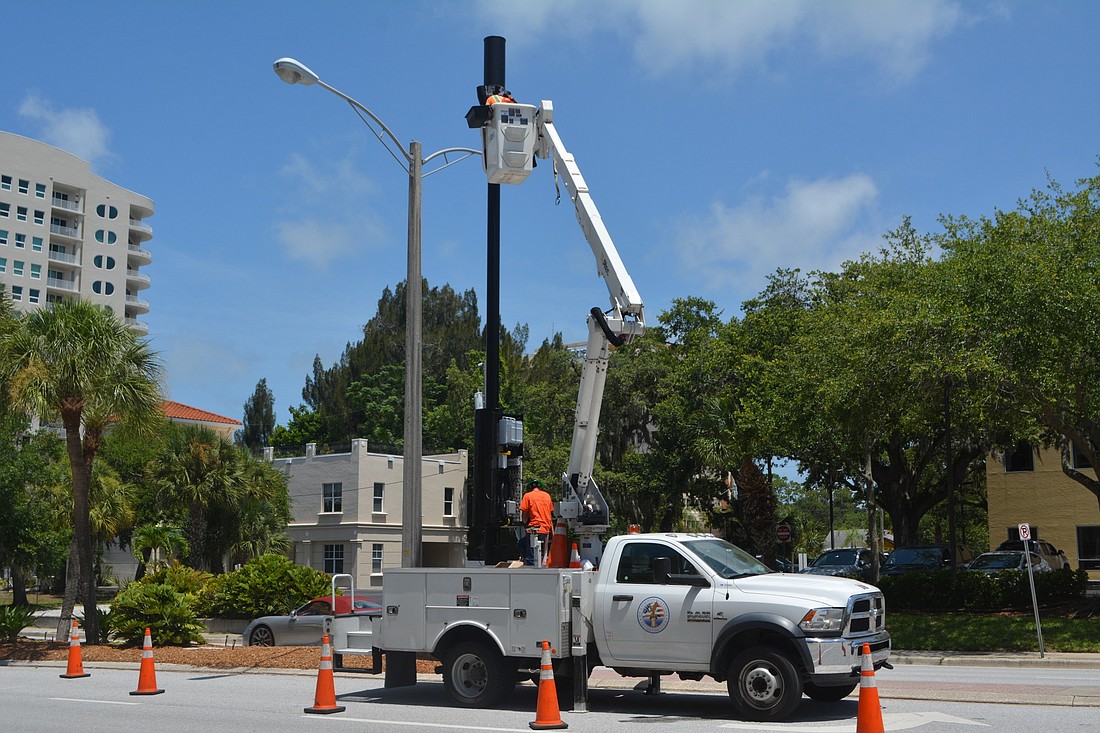- April 8, 2025
-
-
Loading

Loading

When 46-year old Joelah Ariel first heard the latest alpha-numeric buzzword — 5G — she wasn’t sure what it was, let alone what it might someday mean to her community. A 19-year resident of Sarasota, she said she first stumbled across the term on a Facebook page warning of electromagnetic radiation.
Curious, she further read that large communications companies, such as Verizon and AT&T, are looking to increase their cellular data capabilities by moving beyond today’s benchmark of 4G LTE to 5G, and they are rolling it out in about 30 big cities nationwide.
Sarasota is not one of those cities. But the black poles popping up around town could someday support cellular technology’s next big thing. For now, though, they’re hosting small-cell technology to support the existing 4G network.
“[Small cells are] important tools to enhance our 4G LTE network, are designed to complement traditional cell sites or towers and are placed strategically to meet data capacity demand in areas of high customer usage,” Verizon spokeswoman Kate Jay said. “In many locations, small cells are ‘hiding in plain sight’ on existing structures like city traffic lights or utility poles.”
Maybe not hiding very well. Driving around the city — like along Ringling Boulevard, Tamiami Trail or Pineapple Avenue — black poles that lack identifying marks are appearing regularly. In all, 31 are planned.
According to Jay, when installed, 5G will have a “massive impact” on how we live, work and play.
“There will be streaming with virtually no buffering or video chatting with zero lag,” she said. “For gamers, it’s really that console quality. … And now, downloads that took minutes will take seconds. It’s very exciting.”
But should Sarasota residents like Ariel fear the presence of 5G? According to Jay, Verizon wouldn’t install something it knows could adversely impact other people.
Increased data, Ariel said she’s learned, is accompanied by increased levels of electromagnetic radiation. She has started petitions to ban the presence of 5G towers near residential neighborhoods, schools and hospitals.
“I have no problem with my internet speed,” Ariel said. “I don’t think Sarasota necessarily has to conduct [its] own research. I think it would be much more sensible for them to go look at the research that’s being conducted by scientists and doctors.”
The Cellular Telecommunications Industry Association, the trade association representing the wireless communications industry in the U.S., says that 5G is safe.
“[Radio frequency] energy from antennas used in cellular transmissions, including 5G small cells, result in exposure levels well below FCC safety limits,” according to the CTIA. “These limits are based on recommendations from the scientific community and expert non-government organizations. The widely accepted scientific consensus is that towers, small cells, antennas and other cellular infrastructure pose no known hazard to nearby residents.”
This is especially important because, in order to achieve 5G capability, a greater volume of small-cell towers needs to be installed in a given area because they function at lower power levels than traditional, multi-story, macro towers.
And more of these cell towers have been — and will continue to be — erected here in Sarasota.
“[Verizon] applied for permits for a first batch of approximately 30 of these throughout the city,” said Jason Bartolone, a spokesman for the city of Sarasota. Verizon first began to file these permits in January 2018.
State legislation, Bartolone added, requires local governments to allow them in the public right of way, which is why they often are built in medians.
That said, Sarasota does not officially have 5G network capability yet. But with the installation of more small-cell towers, such a high-speed network in Sarasota is a step closer to reality.